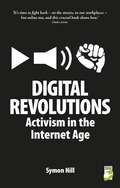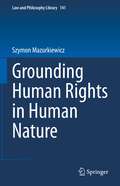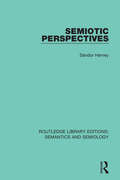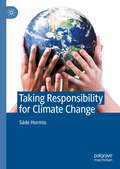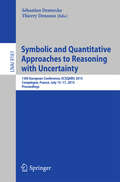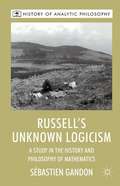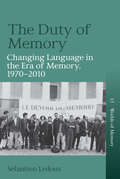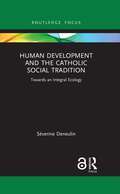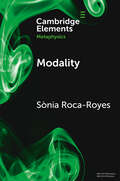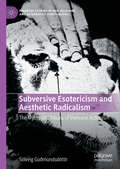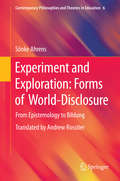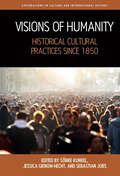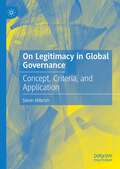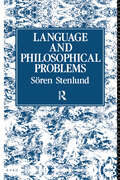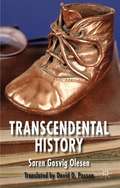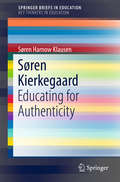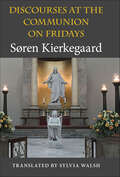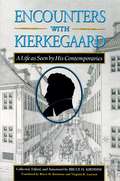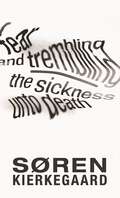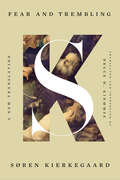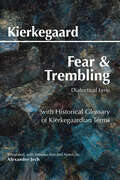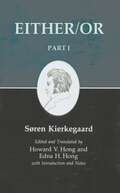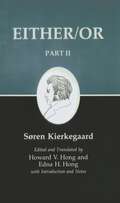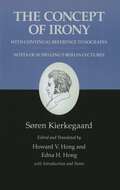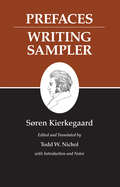- Table View
- List View
Digital Revolutions
by Symon HillFrom Occupy to Uncut, from the Arab Spring to the Slutwalk movement, few questions about recent activism raise as much controversy as the role of the internet. This book suggests that the internet is a tool, not a cause, of social change. It has profoundly affected the way people communicate, making it easier to find the truth, to learn from activists on the other side of the world, to co-ordinate campaigns without hierarchy and to expose governments and corporations to public ridicule. But it has also helped those same governments and corporations to spy on activists, to disrupt campaigns and to create illusions of popular support.Focused on the real-life experiences of activists rather than theory or abstract statistics, Digital Revolutions asks how the internet has affected activism, how it has allowed movements to go global more quickly and what the future holds for corporations and social movements that are doing battle online.Symon Hill has campaigned on the arms trade, religious liberty, same-sex marriage, disability rights, and economic injustice. He has worked with the Campaign Against Arms Trade and the Fellowship of Reconciliation, and was a founding member of Christianity Uncut. He has trained hundreds of activists in campaigning skills and media engagement. In February 2012 he was dragged by police from the steps of St. Paul's Cathedral during the eviction of Occupy London Stock Exchange. He is associate director of the Ekklesia think tank and associate tutor at the Woodbrooke Quaker Study Centre. He writes for The Guardian, Morningstar, The Friend, and Third Way. His first book was The No-Nonsense Guide to Religion.
Grounding Human Rights in Human Nature (Law and Philosophy Library #142)
by Szymon MazurkiewiczWhat does it mean that human rights derive from human dignity? And what is the foundation of human dignity? How are human dignity and its foundation connected? Is the recent development of natural sciences dealing with human nature, like evolutionary psychology, relevant to these questions? The book addresses these points by connecting the discussion on the foundations of human rights with the recent claims regarding human nature made in evolutionary psychology, and with contemporary analytic metaphysics, especially the relation of metaphysical grounding. It offers in-depth insights into the so-called naturalistic approach to human rights, together with detailed proposals on how the approach could be truly naturalized in the philosophical sense. It shows how human rights and human dignity may have foundations in natural facts about human nature and offers a detailed analysis of how the “is” / “ought” gap problematic can be solved.The book also addresses the objection of Western ethnocentrism – unlike most of the contemporary philosophical accounts of human rights, which draw on highly individualistic Western concepts, it employs concepts like altruism and cooperation.
Semiotic Perspectives (Routledge Library Editions: Semantics and Semiology)
by Sándor HerveyFirst published in 1982, this book looks at a wide variety of issues concerning the vast field of study that is ‘semiotics. It begins by tracing the beginnings of modern semiotics in the works two pioneering figures — Saussure and Peirce — in order to present fundamental assumptions, notions and distinctions which provide an essential background to the more recent developments. The author then goes on to look at Behavioural Semiotics, Luis Prieto’s idea of "l’Acte Semique", Austin’s theory of ‘Speech Acts’ and Searle’s elaborations, Barthes’ move away from philosophical and scientific approaches in his ideology of Socio-Cultural Signification, Functionalism and Axiomatic Functionalism, style as a form of communication, semiotics of the cinema, and communicative behaviour in non-human species.
Taking Responsibility for Climate Change
by Säde HormioThis book proposes that it is not only states and international bodies that have a responsibility to take action toward mitigating climate change. Other collective agents, such as corporations, need to also come onboard. Additionally, the book argues that climate change is not solely a problem for collective agents, but also for individuals, as they are members of collectives and groups of several kinds. Therefore, framing climate change responsibility exclusively from either the collective or the individual perspective leaves out something crucial: how we all are influenced by the collectives we belong to and how, in turn, collectives are influenced by individuals. The focus of the book is on areas of climate change responsibility that are often left out of the picture or get too little attention in climate ethics, such as carbon inequality within countries. But why should any theoretical arguments about normative issues matter when we have a real-life climate crisis on our hands? Säde Hormio argues that ethical arguments have an important role in setting climate policy: they can highlight what values are at stake and help ground normative arguments in public deliberations.
Symbolic and Quantitative Approaches to Reasoning with Uncertainty
by Sébastien Destercke Thierry DenoeuxThis book constitutes the refereed proceedings of the 13th European Conference on Symbolic and Quantitative Approaches to Reasoning with Uncertainty, ECSQARU 2015, held in Compiègne, France, in July 2015. The 49 revised full papers presented were carefully reviewed and selected from 69 submissions and cover topics on decision theory and preferences; argumentation; conditionals; game theory; belief update; classification; inconsistency; graphical models; Bayesian networks; belief functions; logic; and probabilistic graphical models for scalable data analytics. Papers come from researchers interested in advancing the technology and from practitioners using uncertainty techniques in real-world applications. The scope of the ECSQARU conferences encompasses fundamental issues, representation, inference, learning, and decision making in qualitative and numeric uncertainty paradigms.
Russell’s Unknown Logicism: A Study in the History and Philosophy of Mathematics (History of Analytic Philosophy)
by Sébastien GandonIn this excellent book Sebastien Gandon focuses mainly on Russell's two major texts, Principa Mathematica and Principle of Mathematics, meticulously unpicking the details of these texts and bringing a new interpretation of both the mathematical and the philosophical content. Winner of The Bertrand Russell Society Book Award 2013.
The Duty of Memory: Changing Language in the Era of Memory, 1970 – 2010 (Worlds of Memory)
by Sébastien LedouxWithin France, the expression “duty of memory” (le devoir de mémoire)speaks to a complex and ever-evolving relationship with the past. Emerging in the 1970s, this term raised questions about memorialization which dominated public debates in the 1990s, highlighting France’s entanglements with colonialism and the Holocaust. Drawing on a variety of interviews, archival sources, and data surveys, author Sébastien Ledoux spotlights how the trajectory of this term offers a lens for understanding contemporary societies’ relationship with the past on a global scale.
Human Development and the Catholic Social Tradition: Towards an Integral Ecology (Routledge Research in Religion and Development)
by Séverine DeneulinThis book brings development theory and practice into dialogue with a religious tradition in order to construct a new, transdisciplinary vision of development with integral ecology at its heart. It focuses on the Catholic social tradition and its conception of integral human development, on the one hand, and on the works of economist and philosopher Amartya Sen which underpin the human development approach, on the other. The book discusses how these two perspectives can mutually enrich each other around three areas: their views on the concept and meaning of development and progress; their understanding of what it is to be human – that is, their anthropological vision; and their analysis of transformational pathways for addressing social and environmental degradation. It also examines how both human development and the Catholic social tradition can function as complementary analytical lenses and mobilizing frames for embarking on the journey of structural and personal transformation to bring all life systems, human and non-human, back into balance. This book is written for researchers and students in development studies, theology, and religious studies, as well as professional audiences in development organizations.
Modality (Elements in Metaphysics)
by Sònia Roca-RoyesModality is a vast phenomenon. In fact, it is arguably a plurality of phenomena. Within it, one type of modality warrants distinctive interest in philosophy and, in particular, in metaphysics. In view of this, this Element has a first part devoted to modality as a general phenomenon, where different types of modalities are distinguished, and where the question of unification is raised. Following this, the second part is focused on metaphysical modality: the type of modality that is of distinctive interest in metaphysics, and thus for the series of this Element. In this second part, the overarching question is about the source of metaphysical modality, and the discussion here informs back, and is informed by, the question of unification from the first part. This title is also available as open access on Cambridge Core.
Subversive Esotericism and Aesthetic Radicalism: The Myths and Rituals of Viennese Actionism (Palgrave Studies in New Religions and Alternative Spiritualities)
by Sólveig GuðmundsdóttirIn this book, Sólveig Guðmundsdóttir uncovers the crucial role of esotericism in the art of the Vienna Actionists—a group of Austrian neo-avant-garde artists, infamous for their transgressive performance art. Addressing this frequently overlooked aspect of Actionism, Guðmundsdóttir traces, historicizes, and examines the esoteric discourses in selected works: the collective manifesto Die Blutorgel (1962), Rudolf Schwarzkogler’s text Das Ästhetische Panorama (1967/68) and the performances Abreaktionsspiel (1970) by Hermann Nitsch, and Zerreißprobe (1970) by Günter Brus. Mapping out the various discursive entanglements as they appear in the works, i.e. between esotericism and psychoanalysis, fascism, gender, sexuality, aesthetics, science, orientalism and religious discourses, the author illustrates and establishes the importance of esoteric traditions for the Actionists’ art and subversive practices. The historical analysis of the artworks reflects on the cultural nexus of post-war Austria, as well as the relations between radical politics, countercultures and esotericism, and how they appear in Actionism. Guðmundsdóttir argues that to survey the historical placement of esotericism is vital for understanding not only the context of their works, but also the contradictory image of the Actionists as both anti-authoritarian and reactionary artists.
Experiment and Exploration: Forms of World-Disclosure
by Sönke AhrensThis book deals with contemporary epistemological questions, connecting Educational Philosophy with the field of Science- and Technology Studies. It can be understood as a draft of a general theory of world-disclosure, which is in its core a distinction between two forms of world-disclosure: experiment and exploration. These two forms have never been clearly distinguished before. The focus lies on the experimental form of world-disclosure, which is described in detail and in contrast to the explorational form along the line of twenty-one characteristics, which are mainly derived from empirical studies of experimental work in the field of natural sciences. It can also be understood as an attempt to integrate elements of the Anglo-Saxon Philosophy of Science with elements of the German tradition of Educational Philosophy. This is also reflected in the style of writing. In accordance to the content-level of the book, the argument for experimental forms of world-disclosure is written in an essayistic, readable style, which can be understood as an experimental form of writing. This book is a translation of the doctoral thesis 'Experiment und Exploration. Bildung als experimentelle Form der Welterschließung' (summa cum laude). The thesis was published in German in 2010 by Transcript (Bielefeld) in the series called 'Theorie Bilden', edited by Prof. Dr. Hannelore Faulstich-Wieland, Prof. Dr. Hans-Christoph Koller, Prof. Dr. Karl-Josef Pazzini and Prof. Dr. Michael Wimmer.
Visions of Humanity: Historical Cultural Practices since 1850 (Explorations in Culture and International History #11)
by Sönke Kunkel, Jessica C. E. Gienow-Hecht, and Sebastian JobsThis book offers a critical reflection of the historical genesis, transformation, and problématique of “humanity” in the transatlantic world, with a particular eye on cultural representations. “Humanity,” the essays show, was consistently embedded in networks of actors and cultural practices, and its meanings have evolved in step with historical processes such as globalization, cultural imperialism, the transnationalization of activism, and the spread of racism and nationalism. Visions of Humanity applies a historical lens on objects, sounds, and actors to provide a more nuanced understanding of the historical tensions and struggles involved in constructing, invoking, and instrumentalizing the “we” of humanity.
On Legitimacy in Global Governance: Concept, Criteria, and Application
by Sören HilbrichGlobal governance has a major impact on the lives of people around the world. However, traditional theories of legitimacy were usually developed for states and are not suitable for the diversity of global governance institutions that exist today. This book first develops a normative concept of legitimacy that is applicable to all political institutions. According to this concept, to regard an institution as legitimate means ascribing it the right to exercise its function in political practice. Secondly, the book discusses how the use of this concept opens up new perspectives in the debate on legitimacy criteria for global governance institutions. In this context, the book analyses the relationship of legitimacy to the values of justice and democracy and discusses the role of feasibility constraints and the all-affected principle in legitimacy judgements. The concept of legitimacy as the right to function opens up the conceptual space to accommodate the insight that legitimacy criteriaare not the same for all global governance institutions, but depend on their function and context. Thirdly, the book applies the developed theoretical framework to a specific global governance institution, the G20.
Language and Philosophical Problems
by Sören StenlundLanguage and Philosophical Problems investigates problems about mind, meaning and mathematics rooted in preconceptions of language. It deals in particular with problems which are connected with our tendency to be misled by certain prevailing views and preconceptions about language. Philosophical claims made by theorists of meaning are scrutinized and shown to be connected with common views about the nature of certain mathematical notions and methods. Drawing in particular on Wittgenstein's ideas, Sren Stenlund demonstrates a strategy for tracing out and resolving conceptual and philosophical problems. By a critical examination of examples from different areas of philosophy, he shows that many problems arise through the transgression of the limits of the use of technical concepts and formal methods. Many prima facie different kinds of problems are shown to have common roots, and should thus be dealt and resolved together. Such an approach is usually prevented by the influence of traditional philosophical terminology and classification. The results of this investigation make it clear that the received ways of subdividing the subject matter of philosophy often conceal the roots of the problem.
Transcendental History
by Søren Gosvig OlesenTranscendental History defends the claim that historicality is the very condition for human knowledge. By explaining this thesis, and by tracing its development from Kant and Hegel to Derrida and Agamben, this book enriches our understanding of the history of philosophy and contributes to epistemology and the philosophy of history.
Søren Kierkegaard
by Søren Harnow KlausenThis book is a succinct guide to Søren Kierkegaard’s contribution to educational thought. Kierkegaard is not usually known as an educational thinker, but the book shows how his key notions and ideas are nevertheless highly relevant to educational theory and practice. It places them within the context of Kierkegaard’s philosophy and the philosophy of his time, while also exploring their significance to issues of contemporary concern, like the question of how far education should aim at fostering useful skills or support more ambitious goals. The central topics are Kierkegaard’s diagnosis of the limitations of objective knowledge and his corresponding emphasis on know-how, personal appropriation and subjective attitude; his analysis of more or less successful forms of self-realization; his ideas about fostering personal development through “indirect communication” and dialogue; and the elements, strengths and shortcomings of the ideal of self-cultivation (German Bildung).
Discourses at the Communion on Fridays (Philosophy of Religion)
by Søren KierkegaardSøren Kierkegaard's 13 communion discourses constitute a distinct genre among the various forms of religious writing composed by Kierkegaard. Originally published at different times and places, Kierkegaard himself believed that these discourses served as a unifying element in his work and were crucial for understanding his religious thought and philosophy as a whole. Written in an intensely personal liturgical context, the communion discourses prepare the reader for participation in this rite by emphasizing the appropriate posture for forgiveness of sins and confession.
Encounters with Kierkegaard: A Life as Seen by His Contemporaries
by Søren KierkegaardEncounters with Kierkegaard is a collection of every known eyewitness account of the great Danish thinker. Through many sharp observations of family members, friends and acquaintances, supporters and opponents, the life story of this elusive and remarkable figure comes into focus, offering a rare portrait of Kierkegaard the man. Often viewed by his contemporaries as a person who deliberately cultivated an air of mystery and eccentricity, Søren Kierkegaard (1813-1855) has been, then and now, a subject of great speculation. His startling attack on the established church, his broken engagement with a young woman from a respected family, and his searing criticisms of literary figures--from the editors of The Corsair to Hans Christian Andersen--are among the acts that brought him much notoriety during his short lifetime. Yet arriving at a sense of the philosopher's personality and motives behind his behavior has been a difficult task. He left no memoirs of autobiography, but in the enormous cannon of his published writings, the author and the person Søren Kierkegaard is problematically present in a welter of disguises. An indispensable path to understanding what he was like as a person, maintains Bruce Kirmmse, is through the observations of his contemporaries. These accounts, ranging from the writings of Meïr Aron Goldschmidt, editor of The Corsair, to the recollections of Kierkegaard's fiancée, are organized around the major episodes of the philosopher's life. They enable us to glimpse, among many things, his spiritual and intellectual development, to get a sense of what it was like to be the object of his friendship or his wrath, and to examine various persons' opinions about his relationship with his young fiancée. The memories of this woman, Regine Olsen, who later married Fritz Schlegel, are among the most moving passages: they reveal her profound suffering, her personal understanding of Kierkegaard, and the satisfaction she ultimately felt, knowing that "he took her with him into history." This collection of first-hand accounts invites the reader to compare and interpret a wealth of fascinating stories, and in the end forms an intriguing "do-it-yourself" biography for both the scholar and general reader.
Fear and Trembling and The Sickness Unto Death
by Søren KierkegaardWalter Lowrie's classic, bestselling translation of Søren Kierkegaard's most important and popular books remains unmatched for its readability and literary quality. Fear and Trembling and The Sickness Unto Death established Kierkegaard as the father of existentialism and have come to define his contribution to philosophy. Lowrie's translation, first published in 1941 and later revised, was the first in English, and it has introduced hundreds of thousands of readers to Kierkegaard's thought. Kierkegaard counted Fear and Trembling and The Sickness Unto Death among "the most perfect books I have written," and in them he introduces two terms--"the absurd" and "despair"--that have become key terms in modern thought. Fear and Trembling takes up the story of Abraham and Isaac to explore a faith that transcends the ethical, persists in the face of the absurd, and meets its reward in the return of all that the faithful one is willing to sacrifice, while The Sickness Unto Death examines the spiritual anxiety of despair. Walter Lowrie's magnificent translation of these seminal works continues to provide an ideal introduction to Kierkegaard. And, as Gordon Marino argues in a new introduction, these books are as relevant as ever in today's age of anxiety.
Fear and Trembling: A New Translation
by Søren KierkegaardThis newly translated Fear and Trembling, a foundational document of modern philosophy and existentialism, could not be more apt for our perilous times. First published in 1843 under the pseudonym Johannes de silentio (“John of Silence”), Soren Kierkegaard’s richly resonant Fear and Trembling has for generations stood as a pivotal text in the history of moral philosophy, inspiring such artistic and philosophical luminaries as Edvard Munch, W. H. Auden, Walter Benjamin, and existentialist Jean-Paul Sartre. Now, in our era of immense uncertainty, renowned Kierkegaard scholar Bruce H. Kirmmse eloquently brings this classic work to a new generation of readers. Retelling the biblical story of the binding of Isaac, Fear and Trembling expounds on the ordeal of Abraham, who was commanded by God to sacrifice his own son in an exceptional test of faith. Disgusted at the self-certainty of his own age, Kierkegaard investigates the paradox underlying Abraham’s decision to allow his duty to God to take precedence over his duties to his family. As Kierkegaard’s narrator explains, the story presents a difficulty that is not often considered—namely, that after the ordeal is over and Isaac has been spared at the last moment, Abraham is capable of receiving him again and living normally, even joyfully, for the rest of his days. Almost inexplicably, “Abraham had faith and did not doubt.” Deftly tracing the autobiographical threads that run throughout the work, Kirmmse initially, in his lucid and engaging introduction, demystifies Kierkegaard’s fictive narrator, Johannes de silentio, drawing parallels between Abraham’s willingness to sacrifice his son and the author’s personal “sacrifices.” Ultimately, however, Kirmmse reveals Fear and Trembling as a fiercely polemical volume, designed to provoke the reader into considering what is actually meant by the word “faith,” and whether those who consider themselves “true believers” actually are. With a vibrancy almost never before seen in English, and “a matchless grasp of the intricacies of Kierkegaard’s writing process” (Gordon Marino), Kirmmse here definitively demonstrates Kierkegaard’s enduring power to illuminate the terrible wonder of faith.
Fear and Trembling: Dialectical Lyric (Hackett Classics)
by Søren Kierkegaard"Faithful to the original Danish text and eminently readable, Jech's translation of Fear and Trembling admirably communicates the literary qualities of Kierkegaard's text, as well as his occasional fits of inspiration. Jech displays an unusual sensitivity not only to the literary/linguistic qualities of Kierkegaard&’s prose, but also to his (often realized) aspirations to philosophical precision. As presented by Jech, Kierkegaard is not simply a gifted writer and speculative theologian dabbling in philosophy, but a philosopher concerned to limn the optimal role of philosophical reflection, and to do so experimentally, especially with respect to matters of morality and faith. The translation is furthermore supplemented by very helpful explanatory notes that convey Kierkegaard&’s own erudition and the multiple influences upon his thinking. The Historical Glossary will become a valuable reference tool for students and scholars of Kierkegaard&’s writings. It is likely to play a welcome role in encouraging an improved understanding of what Kierkegaard means when he employs his idiosyncratic categories, allusions, and vocabulary." —Daniel Conway, Professor of Philosophy and Humanities, Texas A&M University
Kierkegaard's Writing, III, Part I: Either/Or (Kierkegaard's Writings #25)
by Søren KierkegaardSøren Kierkegaard, the nineteenth-century Danish philosopher rediscovered in the twentieth century, is a major influence in contemporary philosophy, religion, and literature. He regarded Either/Or as the beginning of his authorship, although he had published two earlier works on Hans Christian Andersen and irony. The pseudonymous volumes of Either/Or are the writings of a young man (I) and of Judge William (II). The ironical young man's papers include a collection of sardonic aphorisms; essays on Mozart, modern drama, and boredom; and "The Seducer's Diary." The seeming miscellany is a reflective presentation of aspects of the "either," the esthetic view of life. Part II is an older friend's "or," the ethical life of integrated, authentic personhood, elaborated in discussions of personal becoming and of marriage. The resolution of the "either/or" is left to the reader, for there is no Part III until the appearance of Stages on Life's Way. The poetic-reflective creations of a master stylist and imaginative impersonator, the two men write in distinctive ways appropriate to their respective positions.
Kierkegaard's Writings IV, Part II: Either/Or (Kierkegaard's Writings #26)
by Søren KierkegaardSøren Kierkegaard, the nineteenth-century Danish philosopher rediscovered in the twentieth century, is a major influence in contemporary philosophy, religion, and literature. He regarded Either/Or as the beginning of his authorship, although he had published two earlier works on Hans Christian Andersen and irony. The pseudonymous volumes of Either/Or are the writings of a young man (I) and of Judge William (II). The ironical young man's papers include a collection of sardonic aphorisms; essays on Mozart, modern drama, and boredom; and "The Seducer's Diary." The seeming miscellany is a reflective presentation of aspects of the "either," the esthetic view of life. Part II is an older friend's "or," the ethical life of integrated, authentic personhood, elaborated in discussions of personal becoming and of marriage. The resolution of the "either/or" is left to the reader, for there is no Part III until the appearance of Stages on Life's Way. The poetic-reflective creations of a master stylist and imaginative impersonator, the two men write in distinctive ways appropriate to their respective positions.
Kierkegaard's Writings, II, Volume 2: The Concept of Irony, with Continual Reference to Socrates/Notes of Schelling's Berlin Lectures (Kierkegaard's Writings #35)
by Søren KierkegaardA work that "not only treats of irony but is irony," wrote a contemporary reviewer of The Concept of Irony, with Continual Reference to Socrates. Presented here with Kierkegaard's notes of the celebrated Berlin lectures on "positive philosophy" by F.W.J. Schelling, the book is a seedbed of Kierkegaard's subsequent work, both stylistically and thematically. Part One concentrates on Socrates, the master ironist, as interpreted by Xenophon, Plato, and Aristophanes, with a word on Hegel and Hegelian categories. Part Two is a more synoptic discussion of the concept of irony in Kierkegaard's categories, with examples from other philosophers and with particular attention given to A. W. Schlegel's novel Lucinde as an epitome of romantic irony. The Concept of Irony and the Notes of Schelling's Berlin Lectures belong to the momentous year 1841, which included not only the completion of Kierkegaard's university work and his sojourn in Berlin, but also the end of his engagement to Regine Olsen and the initial writing of Either/Or.
Kierkegaard's Writings, IX
by Søren Kierkegaard Todd W. NicholPrefaces was the last of four books by Søren Kierkegaard to appear within two weeks in June 1844. Three Upbuilding Discourses and Philosophical Fragments were published first, followed by The Concept of Anxiety and its companion--published on the same day--the comically ironic Prefaces. Presented as a set of prefaces without a book to follow, this work is a satire on literary life in nineteenth-century Copenhagen, a lampoon of Danish Hegelianism, and a prefiguring of Kierkegaard's final collision with Danish Christendom. Shortly after publishing Prefaces, Kierkegaard began to prepare Writing Sampler as a sequel. Writing Sampler considers the same themes taken up in Prefaces but in yet a more ironical and satirical vein. Although Writing Sampler remained unpublished during his lifetime, it is presented here as Kierkegaard originally envisioned it, in the company of Prefaces.
